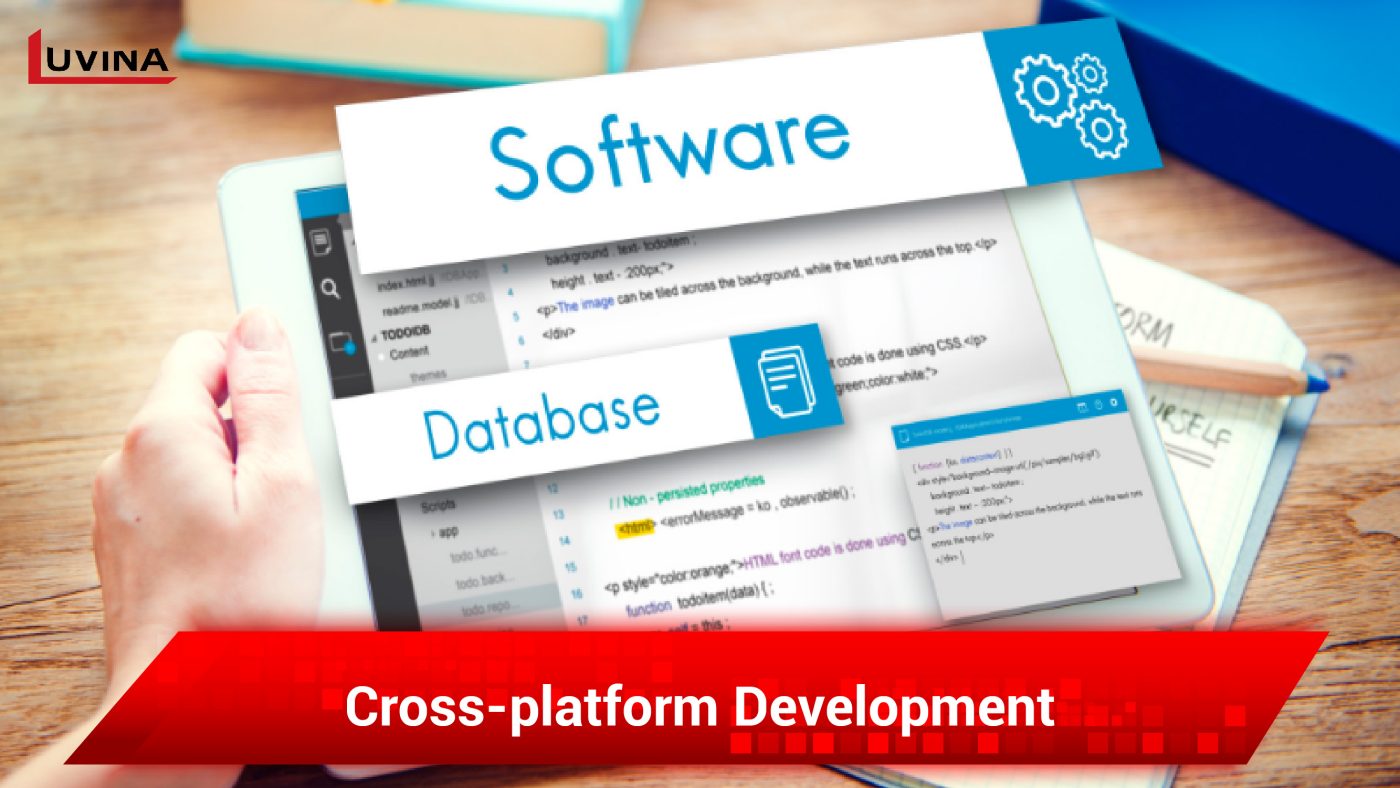In the ever-changing field of mobile app creation, both developers and businesses are continually searching for efficient methods to design apps that can operate seamlessly on various platforms. This quest has brought about the significance of cross-platform app development frameworks, which present a streamlined strategy for producing applications that function smoothly across different devices and operating systems.
In this exploration, we delve into the vital factors to contemplate when embarking on the journey of selecting the ideal cross-platform app development framework. By examining the pivotal elements that contribute to the efficacy and triumph of these frameworks, you will be better equipped to make well-informed decisions that correspond with your development objectives and project prerequisites. Join us as we navigate through the domain of frameworks for cross-platform mobile development.
Exploring the Landscape of Cross-Platform App Development Frameworks
1. Definition of cross-platform development
Cross-platform app development creates software that performs effectively across various platforms, saving time and resources as coding is needed just once for devices like iOS, Android, and Windows. This speeds up work and ensures consistent user experiences.
Utilizing cross-platform development frameworks, developers leverage existing tools to build multi-platform apps. These frameworks balance code reuse and platform-specific adjustments, guaranteeing efficiency and quality. Ultimately, cross-platform development broadens reach without quality compromise.
2. Advantages of Cross-platform Development over Native Development
Cross-platform development, supported by cross-platform app frameworks, offers advantages over native development. This method allows one codebase for multiple platforms, speeding development and ensuring consistent design. It’s cost-effective by avoiding separate teams. Apps reach a wider audience due to cross-compatibility. Maintenance is simpler with unified updates. In summary, cross-platform development through these frameworks is efficient and effective.

3. Growing Popularity and Demand for Cross-platform Frameworks
The rise in popularity of cross-platform mobile development frameworks highlights their crucial role in modern app creation. These frameworks offer efficient solutions for developing apps across various platforms. Their demand is fueled by cost-effective coding, wider audience reach, and adaptability to evolving technology. In essence, the growing preference for these frameworks underscores their essential role in the dynamic app development landscape.
Categories of Cross-Platform App Development Frameworks
1. React Native
- Developed by Facebook.
- Utilizes JavaScript and React.
- Leverages native components for a seamless user experience.
- Ideal for projects requiring iterative updates and fast development cycles.
>> See more: Top React Native App Development Companies
2. Flutter
- Offered by Google.
- Uses the Dart programming language.
- Known for its extensive selection of customizable widgets.
- Celebrated for rapid development facilitated by the “hot reload” feature.
>> See more: Mastering UI/UX Design in Flutter Application Development
3. Xamarin app development
- Within the Microsoft framework.
- Leverages the strengths of the C# programming language.
- Excels in addressing multiple platforms using a single codebase.
- Provides access to native APIs.
Crucial Factors in Selecting a Cross-Platform App Development Framework
1. Target Platforms and Devices
When deciding on a cross-platform app development framework, certain key factors should guide your choice.

It’s crucial to confirm that the selected framework works smoothly on different devices. The success of your app greatly relies on its capability to function seamlessly across diverse platforms and devices. This compatibility guarantees a broader user reach, ultimately boosting the app’s effectiveness.
Deliberating on the compatibility of the framework with different operating systems like iOS, Android, and Windows is paramount. This consideration ensures that your app can effectively cater to the preferences of a varied user base.
2. Development Speed and Efficiency
In the realm of cross-platform app development, expediency and efficiency are crucial factors that demand consideration.
An inherent advantage of cross-platform mobile development frameworks lies in their code reusability. Evaluating the extent to which the framework enables you to reuse code across various platforms is key. This capability simplifies development and reduces repetitious efforts, which can considerably speed up the process.
Cross-platform app development frameworks, a core part of cross-platform app development, naturally offer time-saving benefits. By utilizing a unified codebase that operates across numerous platforms, developers can avoid the necessity of crafting distinct codes for each platform. This not only expedites the development process but also guarantees uniformity in both the app’s design and operational features.
3. User Experience and Performance
The user experience and performance of your app are central to its success, making this area a critical consideration in cross-platform app development.

The chosen cross-platform mobile development frameworks can significantly influence how your app performs and responds to user interactions. It’s essential to assess how well the framework optimizes performance across different platforms and devices, ensuring that users receive a seamless and efficient experience.
In the realm of cross-platform app development, the availability of native-like user interface (UI) components within the chosen framework is pivotal. These components replicate the look and feel of platform-specific UI elements, enhancing the user experience by providing familiarity and consistency.
4. Development Team’s Expertise
When evaluating cross-platform mobile development frameworks, it’s essential to appraise the familiarity of your development team with the considered frameworks. Employing frameworks that match your team’s proficiency can result in a streamlined development procedure and more efficient utilization of the accessible resources.
If opting for new cross-platform app development frameworks, account for the learning curve your team might encounter. While new frameworks might offer distinct advantages, the time and effort required to become proficient should be taken into consideration, as this could impact the project timeline.
5. Community and Support
The extent of available documentation and resources for a cross-platform mobile development framework is a key consideration. Ample and well-structured documentation can greatly expedite the development process, serving as a valuable reference for your team.

A thriving and responsive community associated with the chosen cross-platform app development framework can be invaluable. An active community often signifies a pool of experienced developers willing to help troubleshoot issues and share insights, contributing to a smoother development journey.
6. Third-Party Libraries and Plugins
Check how well cross-platform mobile development frameworks integrate popular third-party libraries and plugins. These resources enhance app functionality with ready-made solutions.
The inclusion of these resources affects the development speed and feature availability. They expedite development and offer diverse features without extensive custom work.
7. Maintenance and Updates
For cross-platform app development, framework maintenance and updates are key.

Check how often the framework is updated and the support it offers. Regular updates ensure tech alignment and security.
Consider the framework’s long-term sustainability and compatibility. A strong framework adapts to evolving platforms.
8. Cost Considerations
Examine potential licensing fees associated with proprietary cross-platform mobile development frameworks. These fees can impact your budget and overall project cost.
Evaluate the cost of development and maintenance across different frameworks. This includes assessing factors like development speed, ease of updates, and ongoing maintenance requirements.
9. Performance Optimization
Assess how well the chosen cross-platform mobile development framework can optimize performance across diverse devices and platforms. Ensuring a smooth user experience is essential for app success.
Striking a balance between performance optimization, development speed, and ease of use is essential. A framework that offers robust performance without compromising development efficiency is ideal.
10. Security and Data Privacy
Scrutinize the security features of the selected cross-platform mobile development framework, as well as any known vulnerabilities. A secure framework safeguards your app and user data.

Reflect on the framework’s compatibility with data protection regulations and compliance standards. Ensuring that your app adheres to privacy guidelines is crucial.
In-depth Exploration of Noteworthy Cross-Platform App Development Frameworks
Embarking on a thorough examination of esteemed cross-platform frameworks is pivotal to ensuring an informed and successful decision-making process.
1. Comprehensive Understanding of Prominent Cross-Platform Frameworks
Dive deep into an all-encompassing analysis that sheds light on the intricacies and functionalities of various cross-platform mobile development frameworks that hold a significant presence in the industry.
2. Unveiling the Uniqueness and Advantages of Each Framework
Uncover the distinguishing attributes, advantages, and capabilities that set each framework apart from the rest. This comprehensive and insightful investigation empowers you to discern and select the framework that aligns seamlessly with your project’s intricacies and ambitions.
>> See more: Cross-Platform App Development Language and Strategies
Conclusion
In the dynamic landscape of app development, selecting the ideal cross-platform app development framework is a pivotal decision. This exploration of key factors has illuminated the crucial aspects that guide this choice. From assessing device and operating system compatibility to evaluating speed, user experience, and security, each facet shapes the framework’s suitability. The expertise of the team, community support, costs, and framework uniqueness also contribute to the evaluation. Exploring popular frameworks emphasizes aligning unique features with project goals for efficient development and enhanced user experiences. In conclusion, this process is intricate yet vital. By considering these factors, businesses and developers can make informed decisions that lead to successful app development.
{ Get everything you ever
wanted to know about IT.}








Read More From Us?
Sign up for our newsletter
Read More From Us?
Sign up for our newsletter